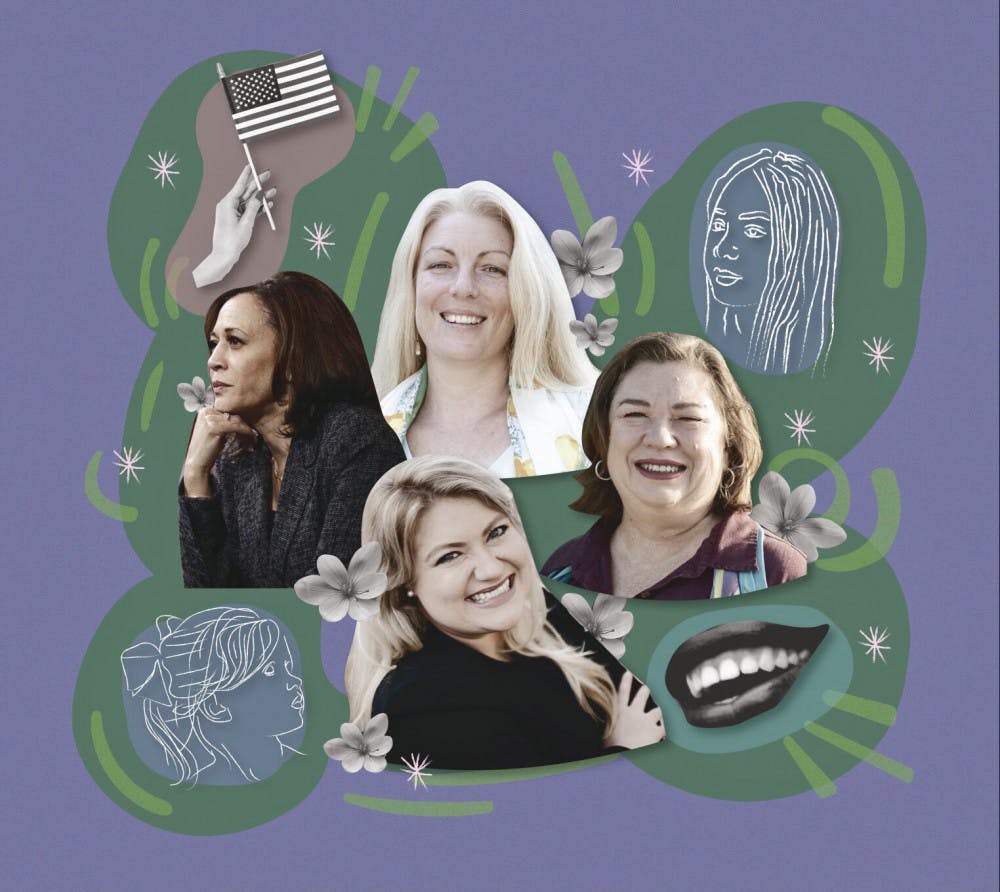
From left: Kamala Harris, vice president-elect; Anna Prizzia (top), Alachua County Commissioner-elect; Kat Cammack (bottom), elected to serve District 3 in the U.S. House of Representatives; and Mary Alford, Alachua County Commissioner-elect.
Tuesday night’s election was historic for representation in local, state and national politics. Women now hold a majority on the Alachua County Commission, more seats in Congress nationwide and the vice-presidency.
Both Democrat and Republican women won big Tuesday night in several Florida and Alachua County races. Three newly elected representatives will join other female officials who currently serve Alachua County, such as County Manager Michele Lieberman, County Attorney Sylvia Torres and Supervisor of Elections Kim Barton.
Kamala Harris, who is Black and Indian American, will be the first woman and person of color to serve as vice president.
Prior to the 2020 election, women made up only 23.7% of the U.S. Congress and 29.3% of state legislatures nationwide, according to a report from Rutgers University’s Center for American Women and Politics. Congresswomen of color only filled 9% of 535 seats.
Now, after Tuesday’s election, women make up 25% of the total seats in Congress as of Nov. 8, including several Black, Native American, Latinx and Muslim women. Prominent congresswomen of color reelected include Alexandria Ocasio-Cortez and Deb Haaland, who will be joined by congresswoman-elect Cori Bush.
Kat Cammack, the 32-year-old former chief of staff for former Rep. Ted Yoho, is now the youngest Republican woman elected to serve District 3 in the U.S. House of Representatives. The district encompasses Alachua, Clay, Bradford, Union, Putnam and Marion Counties.
Anna Prizzia, 43, and Mary Alford, 59, both Democrats, won seats on the Alachua County Commission. All four county commission candidates on the November ballot were women. Prizzia and Alford will go on to comprise a new female majority on the Alachua County Commission along with District 2 County Commissioner Marihelen Wheeler.
Both seats were formerly held by men.
Commissioner-elect Alford said she spent most of her career in the male-dominated field of engineering, and she was often the only woman in the room. She’s hopeful that the female majority commission will address inequities in Alachua County, such as homelessness and the divide between smaller cities in the county and Gainesville.
“Women are used to picking up the kid with the skinned knees or taking care of someone that’s sick,” Alford said. “I want to give everyone in our county a virtual hug, and the other women on the commission want to do the same.”
Wheeler spent two years as the only woman on the commission. She said she’s excited to work with a new slate of empathetic, passionate leaders who are willing to listen to one another.
“We’re going to be rocking the house,” Wheeler said. “With the pandemic, we’re going to have to be thinking as creatively as we can, and I think women do that well. We’re creative and empathetic problem-solvers.”
When women are represented by other women, they may feel that their voice is heard, said Beth Rosenson, a UF political science professor. People can also feel more represented by elected officials of the same race and ethnicity.
Research shows that female elected officials are more likely to be better listeners and more empathetic, Rosenson said. She referenced studies where political scientists studied hearings with female legislators. They found that women were less likely to interrupt and more willing to listen.
However, Rosenson said party affiliation plays a role in perceived representation. Women also generally tend to be more liberal, she said, adding that the newly elected county commissioners could signal a shift to the left in local decision-making.
“One caveat is that partisanship matters, too,” Rosenson said. “For women who aren’t Republican, descriptive representation only goes so far. Just the fact that she’s a woman alone may not make certain female voters feel more represented.”
Latalyia McKnight, a 33-year-old Gainesville resident, said she feels a connection to Harris not only as a woman of color, but as a member of the same sorority: Alpha Kappa Alpha. Her nieces, who are 6 and 7, now have a woman of color in a position of power to look up to.
“I feel a sense of hope again,” she said. “For every Black, brown, white, Indian and other child in the country — this is something they can look at and say ‘it’s possible.’”
A first-time voter, Amy Nicholas was inspired by how many female candidates were on her ballot this year.
The 19-year-old UF political science and natural resource conservation sophomore said she hopes to bring about systemic change through the local and state political sphere one day as an elected official.
“In any situation that you see injustice, you have a chance to either complain or take action,” she said. “Women who are also fighting for not just female values but using their platform for all is what I truly think is inspiring beyond just females being in office.”
LaRaven Temoney, a 23-year-old UF American politics doctoral student, feels hopeful because of the outcome of Alachua County’s elections. Temoney said she thinks it’s important that all elected officials reflect the identities and interests of the people they represent.
“As children, we can only go by what we see and what we hear,” Temoney said. “If a child is thinking about politics and all they see are people who don’t look like them, who don’t come from where they come from, who don’t speak like them — they may feel excluded and be politically disengaged.”
Although she doesn’t agree with Cammack’s views, Temoney said she applauds her ambition and commitment despite sexist attacks against her during the crowded Republican primary.
When attending county commission meetings, Temoney said she’s noticed that some male commissioners are less willing to compromise and listen to other perspectives.
“I’m hoping that the two new female commissioners don’t get unnecessary pushback just because they’re women,” she said. “I don’t want people to get caught up in sexist rhetoric. Instead, we should focus on policy.”

Alan Halaly is a third-year journalism major and the Spring 2023 Editor-in-Chief of The Alligator. He's previously served as Engagement Managing Editor, Metro Editor and Photo Editor. Alan has also held internships with the Miami New Times and The Daily Beast, and spent his first two semesters in college on The Alligator’s Metro desk covering city and county affairs.





